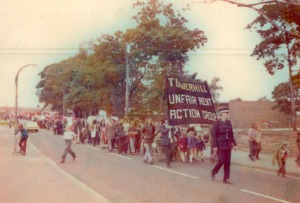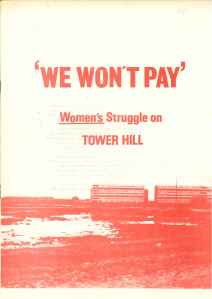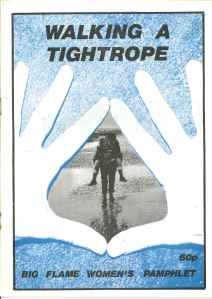EPISODES IN BIG FLAME HISTORY: No 4. Women and Feminism Part 1
Posted by archivearchie on May 12, 2009
Big Flame probably made a more serious and sustained effort to incorporate feminism into the organisation than any other British left group of the 1970s and 1980s (If you think I’m wrong, please nominate your contender). This doesn’t mean that things were easy. There were failings, fierce arguments and confrontations along the way. A useful short overview about women in the group is available in an article in the Discussion Bulletin of February 1981. It covers, for example, the interventions by Big Flame women at Women’s Liberation Movement conferences in the 1970s, and the successes and failures of raising feminism within Big Flame. Click here to view the article History of women’s movement within BF (warning: this may take over a minute to appear).
Tower Hill
From the summer of 1972 women in Merseyside Big Flame started meeting together. By the end of the year, they had formed an autonomous women’s group. Many women withdrew from other base groups, such as the Ford’s one, to focus on the women’s group. The group’s first major intervention was on a Council estate called Tower Hill, outside Liverpool in Kirkby – an estate with 2,500 homes.
The National Government had introduced the Housing Finance Act 1972. This promoted so-called “fair rents”, whereby local Councils would be forced in stages to increase rents according to the value of the house as if it were for sale on an open housing market. The Act came into force on the 2nd October 1972. Rent strikes by tenants followed. One of the most militant was in Tower Hill. 3,000 tenants started a total rent strike on the 9th October 1972. The protest lasted until 24th December 1973. The Big Flame women didn’t live on the estate, and were therefore external militants. They worked with women living in Tower Hill to form a women’s group on the estate.
Women in Big Flame wrote an account of the struggle in Tower Hill. It does not claim to be a full account of the rent strike, focusing on the role of the Women’s Group and Big Flame. It was first published in Big Flame Journal no1 Winter 1974/75. Then it was reissued as a separate pamphlet in 1975. Click here to view We Won’t Pay (warning: this may take over a minute to appear).
Walking a Tightrope
In 1980 women in Big Flame produced another pamphlet. Its title is explained by this quote: “We are always walking a fine line – between seeing the need for autonomous movements, and seeing the need for a mixed national organisation such a Big Flame. We want our organisation to be a place where we can work out ideas together, make links between the different struggles, understand the relationship between sex and class, and generalise our politics. We are producing this pamphlet despite the difficulties, because we feel it’s vital to walk that line, vital to develop an approach which many people share with us, and we feel confident enough that those links can be made. We do not have all the answers, but we would like to think that we have a specific contribution to make in pointing out ways of fighting as feminists and socialists under this Tory government”.
The pamphlet has sections on male violence, community, work, imperialism and other topics. Click here to view the pamphlet – split into three parts (warning: these may take over a minute to appear):
Walking a Tightrope: front-p11
Women’s Struggle Notes
In addition to the two pamphlets, there was a periodical called Women’s Struggle Notes. It first appeared in a duplicated format for around eight issues in 1975-76. It reappeared in a printed version for around another five issues in 1977. The first series was attributed to “Big Flame Women’s Group” and the second “an open editorial group of women”, some members of Big Fame and some not. The publication was made up of short articles. Many of them about workplace struggles, but also on topics like housework, health, rape and sexuality.
Some Internal Debates
Inside BF a variety of debates can be found in the Internal Bulletin and other internal documents. This post will focus on that about Wages for Housework and an independent state income for women.
The first phase of the debate was about Wages for Housework. This was a demand first made around 1972. The writings of Mariarosa Dalla Costa, of the Italian group Lotta Feminista, and a British group the Power of Women Collective, played important roles in developing a campaign around the slogan. Here are four contributions to a debate in BF which followed:
Introduction to Meeting of Liverpool Big Flame Women’s Group on Wages for Housework (internal document 1976)
Why Wages for Housework is not Enough (Internal Bulletin April 1976)
A Reply to CD’s Document on Wages for Housework (Internal Bulletin May 1976)
Wages for Housework is not Enough but is Necessary (Internal Bulletin May 1976)
The author of the first article argued in favour of supporting the demand on the grounds that the position of women will not change without them being economically independent and housework being recognized as work. In the second article another women in BF responded not disagreeing with the ideas behind the demand, but felt it lacked the ability to help organize working class power contained in other demands such as A Woman’s Right to Chose (for example in her own situation in a hospital). Also the sectarian behaviour of Power of Women would mean that BF would have to spend endless hours justifying how BF’s demand was different from their’s.
The third article takes a stronger position against Wages for Housework. She argues that feminists must find ways of destroying capitalism’s ability to define women in ways that suit it. They need to struggle against capital’s organisation of work and not work itself. Housework should be socialized on our terms. The original writer returns to the debate in the fourth article. She accepts that Wages for Housework in not enough, but thinks it is right. She sees no alternative to the demand in a society where women are tied to housework. Wages for Housework and the socialisation of housework go together, rather than being alternatives.
Whatever the views of some individuals, Big Flame as a group never endorsed the demand of Wages for Housework. It did come out in support of an independent state income for women. The demand for guarantied independent income was seen as a way of developing the Women’s Liberation Conference’s support for legal and financial independence. Apparently, its origins lay in discussion with housewives from the Tower Hill estate, near Liverpool. At the October 1976 Big Flame Conference the demand was adopted in the following form: “guaranteed, adequate, independent income for all women, including housewives”. It was accompanied by three other demands for “the socialisation of housework, paid for by the state, controlled by the working class”; for “housework to be paid for by the state, whoever does it and wherever it is done”; and “no division of labour between men and women, both inside and outside the home”. The case for this position is argued in this document: Women’s Commission Report to Big Flame Conference 1976 (conference document 1976).
The supporters of the position maintained that it was not the same as Wages for Housework. It did not assume that housework is done by women. Nevertheless, a lot of women in the organisation were unhappy with the approach, and debate continued up to the May 1978 Conference. A new set of demands emerged which aimed to make even clearer that housework was not women’s work, by amending the most ambiguous of the demands. The proposed new position was:
- A rewording of one demand to read “an independent income for all” i.e. omitting the references to both women and housewives.
- Dropping the position on housework being paid for by the state and replacing it by one of the state providing money and facilities to make housework easier.
- Retaining “the socialisation of housework”, but replacing the reference to working class control to community control.
- Keeping the same wording in relation to “no division of Labour”.
- Adding a new demand for no cuts and an increase in the social wage.
The supporters of the previous position originally opposed the change, then well in line with the proposals. The Conference adopted the new five demands. No subsequent BF Conference made further changes to this position. However, the 1980 pamphlet Walking a Tightrope does not mention the demand for independent state income.
After the conference another writer sought to take the debate about domestic labour in a different direction: Housework: Its Role in Capitalist Relations of Production and in Revolutionary Strategy (Internal Bulletin June 1977). She argued that BF had theorised about the role of housework without much link to practice. In the struggle against housework, unlike other sectors of struggle, too much emphasis had been placed on money and not enough on structure. Those fighting for a revolution needed to ensure that the manner of the servicing and reproduction of the workforce is not neglected in the new society. Books by Ann Oakley and Delia Davin are examined for the beginnings of a new perspective.
Archive Archie
Notes:
(1) This is the first part of a three part series covering gender issues and Big Flame. See Episode 17 and Episode 29.
(2) This post was amended on October 29, 2009. The second half from the sub heading “Women’s Struggle Notes” downwards was added



conatz said
wow, this is a great find. thanks for putting all this up.
c0mmunard said
Readers might be interested to know that the Rent Strike described in the We Won’t Pay is the subject of one of the most fascinating documentary films about working class life and struggle – Nick Broomfield’s Behind the Rent Strike, which can be seen online here:
http://video.google.com/videoplay?docid=7705988299786762690
Tamera said
This excellent film seems to cut off before the end. Anyone know if there is a full length version anywhere? In any case – very worth watching. Thanks.
Learning to Fight, Learning to Heal – Unity and Struggle said
[…] Flame. “History of Women in Big Flame.” (1 […]
Repost: Learning to Fight, Learning to Heal – werehirwerequeer said
[…] Flame. “History of Women in Big Flame.” (1 […]